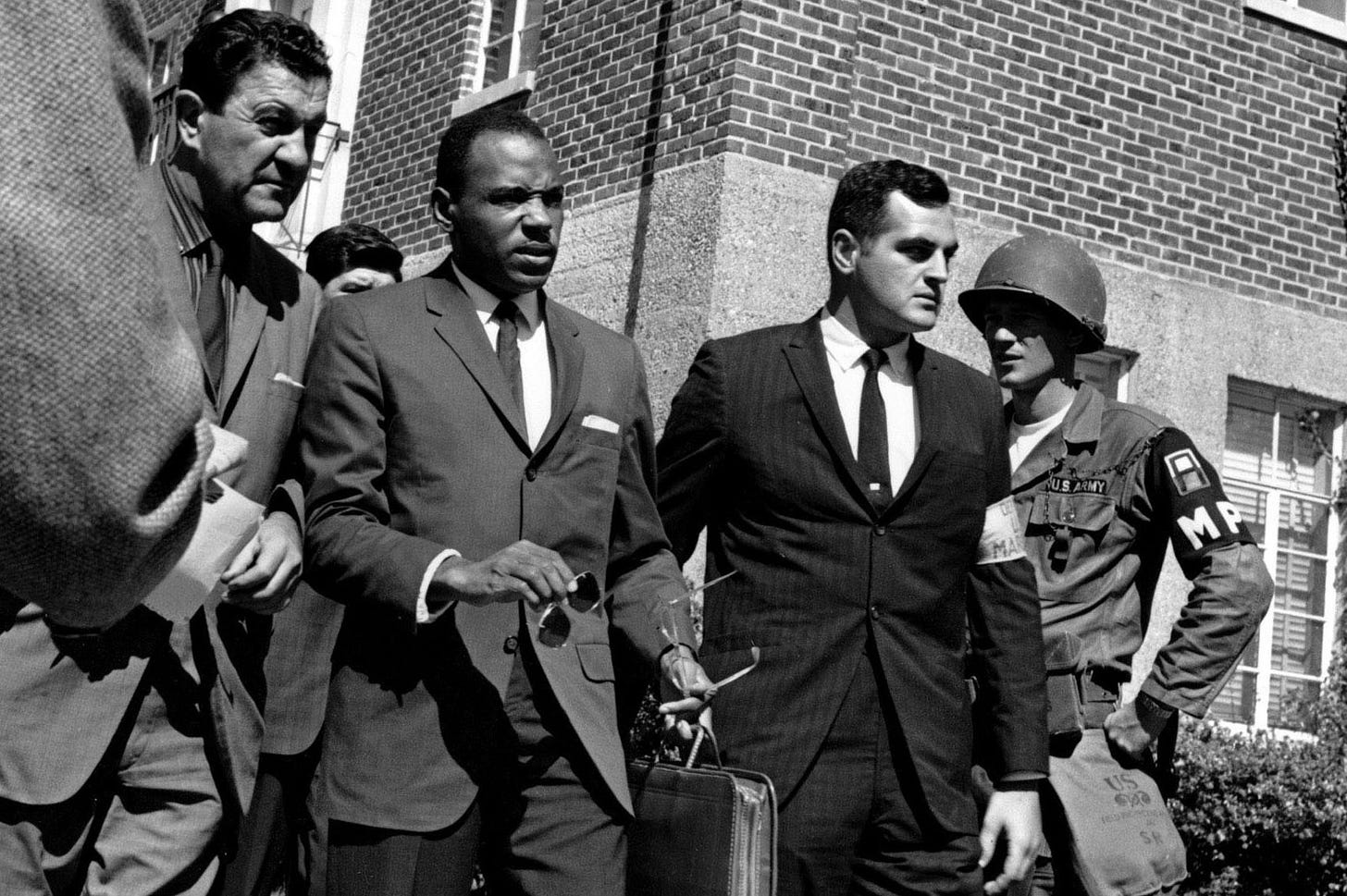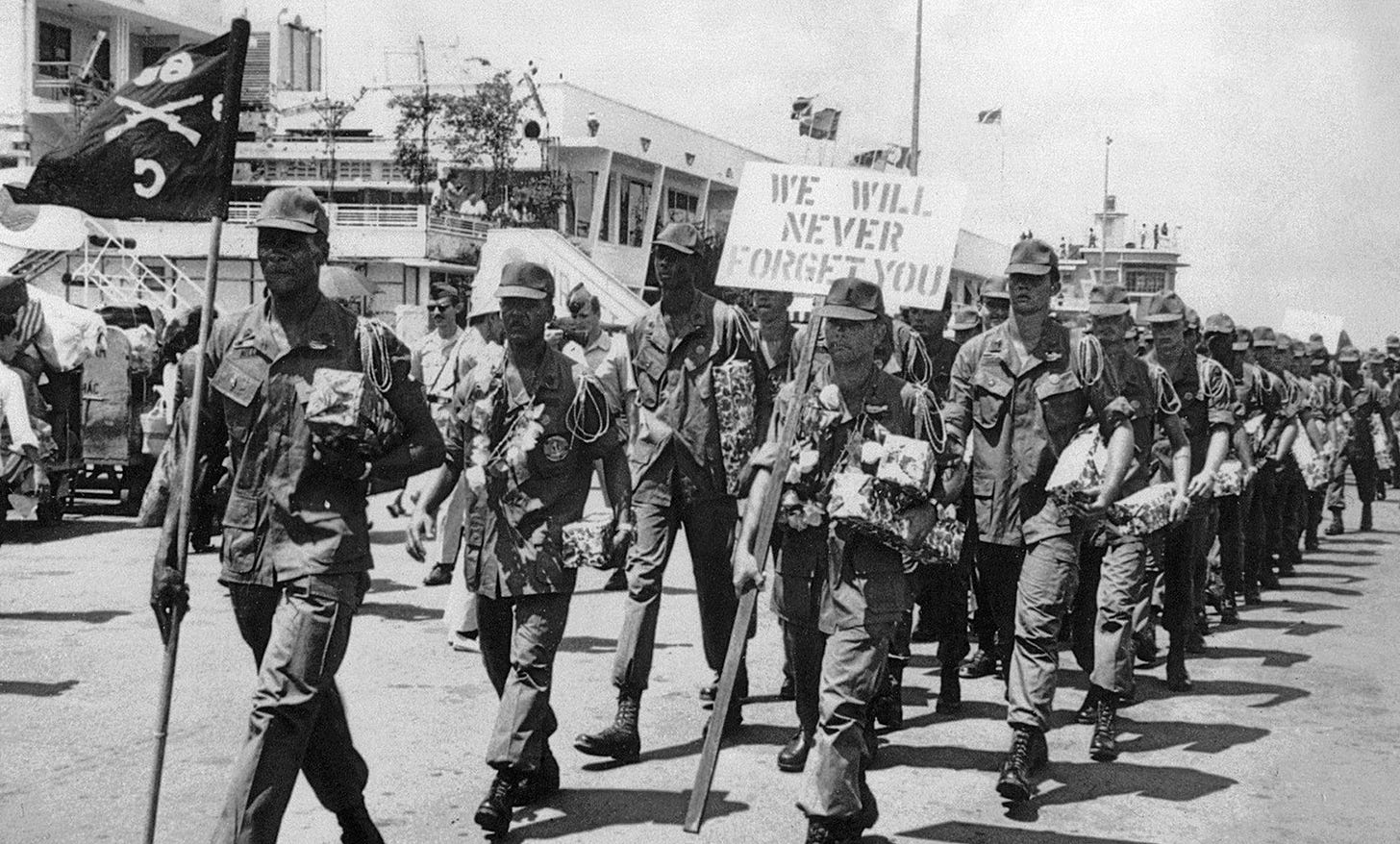
Over a semester break in 1962, my sophomore year in college, Bill Higgs, a white civil rights lawyer from Mississippi who was a fellow at Brandeis invited two other students and me to accompany him to the state, on what I came to consider my unforgettable edge-of-history experience.
In a week we met everyone who over the next few years would be at the center of the national civil rights movement: Fannie Lou Hamer, Medgar Evers, Aaron Henry, Bob Moses, Governor Ross Barnett (“God meant the races to be separate, sure as he made little green apples”), the writer William Faulkner, only months before he died.
And we met James Meredith, a twenty-nine-year-old Black man who was applying for admission to Ole Miss, the state university, starting in the fall. With an incipient reporter’s instinct, I asked him to write about what he hoped to achieve for the prospects of what he and we called Negroes in the South.
Weeks later, I received a three-page single-spaced letter, which began:
I finally got around to writing to you. I can’t say that I caught up with my work, but the quarter is over and a new one has begun. I hope that you all are getting alone fine….
In October, as Meredith was escorted into the university with the protection of federal troops, the Brandeis Justice published his letter under the headline, “The Southern Negro: His Hope for the Future.” The story was picked up by the Associated Press and ran in the New York Times, with my name as the recipient.
(As you can imagine, my astonished parents were thrilled.)
This week my wife and I are returning to Mississippi. I called Meredith, now nearly ninety, at his home in Jackson and asked if we could visit him. “If I pick up the phone,” he said, “that means I’m alive and the answer is yes.” I retrieved his letter from the Ole Miss archives and was told that Meredith made copies of everything he wrote.
Although the material was printed in full by the Brandeis student newspaper, the archivist said that I should get his permission before publishing it again.
I hope to do that and to report my reflections on the trip in Platform when we return.
*******************
This spring marks the fiftieth anniversary of the departure of the last American POWs and GIs from Vietnam. The war went on for another two years before the North Vietnamese victory, but the “American War” – our losing effort to forestall a communist takeover in the southern half of the country – was over.
Except that it really was not. For decades, in any number of ways, the impact of the war has been felt in our politics, in our culture, and in our overall national morale. The United States had never lost a war before. I was in Vietnam between 1970 and 1973 as a correspondent for the Washington Post and have maintained an interest in the war and the country ever since.
In 2019, at PublicAffairs, we published a book called In That Time: Michael O’Donnell and the Tragic Era of Vietnam by Daniel H. Weiss, in my editorial judgment one of the finest books about the soldiers who fought and died in that conflict. The book is now being reissued in paperback and is available as an ebook and on audio from Audible.
Dan and I have organized a day-long event on April 29 in Washington called “Vietnam: A 50 Year Retrospective,” in the belief that there is a great deal to be considered with the benefit of fifty years of history. There will be a series of panels, not actually about the war itself but about the consequences of the conflict for the United States.
Below is a description of the event and a place to register to attend. It will also be televised live on C-Span that day and available on the website thereafte
Hello,
Peter Osnos and I are pleased to announce that we will be hosting Vietnam: A 50-Year Retrospective on April 29, 2023 on the campus of George Washington University in Washington, D.C. We hope that you can join us for a day of discussions to explore the deeper meaning and long-term consequences of the Vietnam War in light of recent events and from the vantage point of a crowded half-century. Our interest in this subject is longstanding: I am the author of In That Time: Michael O’Donnell and the Tragic Era of Vietnam and Peter Osnos covered the war for the Washington Post before founding the publishing house PublicAffairs. The panelists for our program and invited guests such as yourself include many of the most perceptive and recognized participants in the Vietnam story (see link below for program and registration information). We very much hope that you will join us for this important event.
This free day-long conference will be held on Saturday, April 29 in the Jack Morton Auditorium on the GW campus. The event is being sponsored by the Wallace Foundation, Carnegie Corporation of New York, and GW’s Columbian College of Arts & Sciences. Lunch will be served for all guests.
As Peter and I believe that this conference may be of special interest to you, I am sending this email and the registration link in advance of a public announcement. I encourage you to review our program and to register now so that we may confirm your reserved seat. However, if you are unable to attend in person, CSPAN will be televising the event live.
https://columbian.gwu.edu/vietnam-50-year-retrospective
Event Details
Saturday, April 29, 2023
9 am to 4 pm ET
Jack Morton Auditorium - George Washington University – Washington, DC
Sincerely,
Dan








Thanks Mike. It will be live on. C-Span 2 and then on the site I’m peter.osnos@ Gmail.comLots of overlap to discuss. P
Peter, I’m sorry I won't be able to get to your event at GW tomorrow, but we will be in Brooklyn at a baby shower for son Christof and daughter-in-law Carolyn's baby boy due in late May. Having shared some of the same experiences (Meredith's admission to Ole Miss and, of course, Vietnam), I would love to hear your take on same. This is a rather open forum for a private message, but the only email address I could find for you is @publicaffairs, just a bit dated. Let me know if your event will be streamed afterward. All set, Michael Putzel, www.michael putzel.com, mputzel@trysail.com